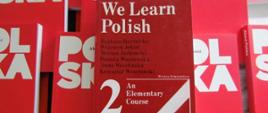Embassy of the Republic of Poland in Pretoria promotes Polish language in South Africa
22.02.2020
On the occasion of the International Mother Language Day, the Embassy of the Republic of Poland in Pretoria participated in the project called "Multilingualism Challenge", which was organized by the Goethe Institute in Johannesburg in cooperation with a number of Embassies accredited in South Africa, Institutes of Culture, academic centers, EU delegation, and EUNIC (Association of European Union National Institutes of Culture).

The event aimed to draw the attention of South African citizens to the richness of the linguistic diversity of the world, the importance of indigenous languages, as well as the intellectual and cultural wealth associated with it. Interactive classes, competitions and language workshops aroused great interest of the guests. Participants of language workshops could learn basic courtesy phrases in a number of languages, and thus pay attention to the beauty and melodiousness of the Polish language. Many people who took part in the celebration of the International Mother Language Day had contact with Polish language for the first time in their life. At the information stand, the Embassy of the Republic of Poland presented materials on language courses in Poland, presented the Polish scholarship offers, and promoted the cultural and tourist wealth of our country.
The debate on "The Importance of Education in the Mother Language" with the participation of Professor Jonathan Jansen (lecturer at the University of Stellenbosch), Dr. Makhosi Khoza (recognized South African politician and advocate for the fight against corruption in South Africa), Karien Brits (Institute of Culture and Language) Afrikaans ATKV) and dr Samia Chasi (International Education Association of South Africa IEASA) aroused great interest among the attendees. The invited guests discussed the importance of protection and promotion of indigenous languages for social, economic and political development of societies, also for building peace and social harmony. Dr Khosa emphasized that learning in the mother tongue, especially during the first 6-8 years of education, positively affects the quality of teaching and the results achieved, as well as learning the official language and other foreign languages. Language is the key to ensuring equal and effective participation of national minorities in the life of a given country. Language is also a tool for fighting for human rights - especially important for small, local communities.
International Mother Language Day has been celebrated since 2000. It was proclaimed at the 30th session of the UNESCO General Conference on the initiative of Bangladesh. The main idea of the celebration is to emphasize the importance of linguistic diversity for the protection of cultural diversity of the world, as well as for the development of sustainable societies.
The theme of the 2020 Day - 'Languages without borders' - emphasizes the importance of local languages, often common to communities on both sides of the border, for building peaceful relations between them, as well as for the protection of their shared cultural heritage. The community of cultures and languages is a frequent phenomenon among local communities in Sub-Saharan Africa or Latin America.
Photos: Grażyna Koornhof/Embassy of the Republic of Poland in Pretoria
